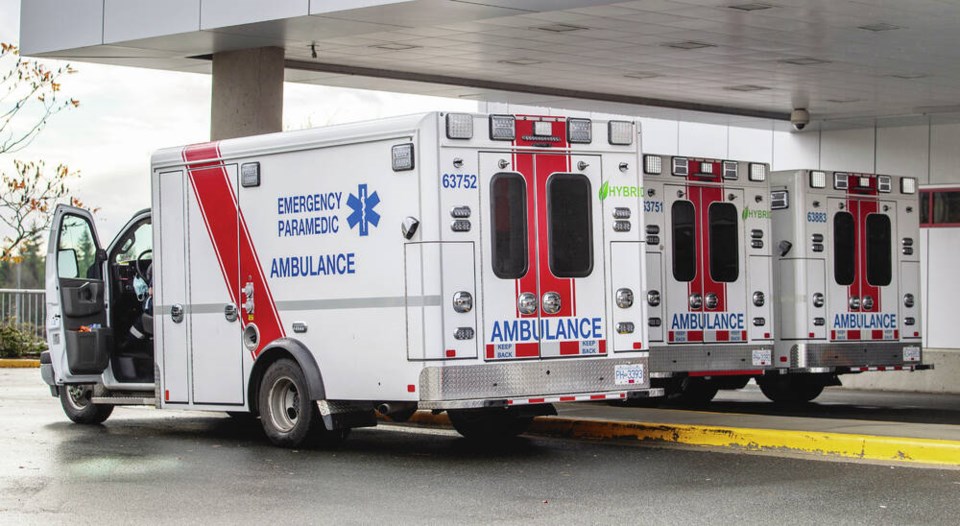People calling 911 for an ambulance were on hold up to several hours over the weekend, delays reminiscent of last summer and fall, when improvements and new hires were promised by the provincial government, says a dispatcher.
“It got better slowly for a while and this weekend it felt like we’d slipped back to zero,” the dispatcher said Monday. The Times Colonist has agreed not to use the dispatcher’s name or gender because the person fears reprisals for speaking out.
B.C. Emergency Health Services said its ambulances responded to a total of 698 calls on Vancouver Island on the weekend.
There are typically about 1,465 calls each day to 911 for ambulances in B.C., but on Saturday there were 1,637.
“At one point, we had 11 call takers — normal staffing being 20 to 25 on any given day — taking 911 calls for the province and 22 calls were waiting,” said the dispatcher. “Each of them were on the phone and had two more calls waiting for each of them.”
An electronic screen at B.C. Emergency Health Services’ dispatch centre shows the number of calls waiting.
During a 12-hour shift overnight Sunday through Monday in a coverage area that includes much of the capital region, only four of nine scheduled ambulances were staffed, said a paramedic. “I don’t understand how we are still in this situation a year later.”
Ideally, additional staff would have been brought in to cover the summer’s first warm weekend, when more people are expected to be outdoors being physically active, but there was not enough staff to fill shifts, let alone bring in extra staff, said the dispatcher.
Calls to E-Comm 911 were answered on average within about 10 minutes, the dispatcher said, but sometimes took up to 30 minutes.
Once the 911 call is handed over to an ambulance dispatcher, they are coded as “purple,” “red” or “orange.”
Ambulances for purple calls, the highest priority — for people who aren’t breathing or are about to stop breathing — were dispatched within about 10 minutes over the weekend, the dispatcher said.
In statistics supplied Monday, BCEHS said it maintained its under-nine-minute target for the most urgent category calls on the weekend.
Those whose calls were coded as red — anything from someone with a cardiac history and chest pain to someone with a severe allergic reaction — were waiting up to an hour for an ambulance in extreme situations, said the dispatcher.
Those whose calls were coded orange, or lowest priority, faced up to three- and four-hour waits.
“There was a period on Saturday that we did see some surges in call volumes and that did leave some people waiting on the line,” B.C. Emergency Health Services said Monday. “Our dispatch staff worked as quickly as possible to take care of patients and we apologize for any delays they experienced.”
BCEHS said it experienced issues with short-notice staff illness on Saturday and had 16 vacant shifts during the day, as well as 11 for the night shift. As of Monday, staffing had improved, it said.
Since last year, BCEHS has implemented a priority queue system with E-Comm 911 to ensure life-threatening calls are answered first. There is also a process to upgrade a call to a higher-priority if a patient’s condition worsens.
About 47 per cent of 911 calls to BCEHS involve less-urgent conditions, said the ambulance service.
Since 2021, BCEHS said, it has added about 500 full-time and part-time permanent paramedic positions in rural and remote areas and at least 125 in urban areas. About 79 per cent of those positions are filled. Forty-two new dispatch positions were also filled.
BCEHS said it also added 22 new ambulances, of which nine have been deployed, with plans for the remainder to be deployed by the end of the year.
A paramedic working the weekend said that just means more ambulances sitting empty, not more ambulances in service.
Troy Clifford, president of the Ambulance Paramedics of B.C., which also represents the emergency medical dispatchers, told the Vancouver Sun on Sunday that there have not been significant spikes in wait times recently, but longer wait times on weekends and in the summer are consistent with past experience, especially when temperatures rise.
Clifford noted that while the province has provided funding to hire more paramedics and dispatchers following last year’s heat dome, hiring staff has been difficult because of the burnout and stress front-line workers experience and also because wages in other similar areas, such as police, firefighting and nursing, are 30 per cent higher.
The dispatcher who spoke anonymously said call takers, dispatchers and paramedics are working as hard as they can under tremendous pressure, but there are simply not enough of them for the work required.
The dispatcher said they’ve advised friends and family that if it’s possible to get themselves to hospital safely on their own, that’s the best route. “It’s scary but that’s the reality we’re working with right now.”

